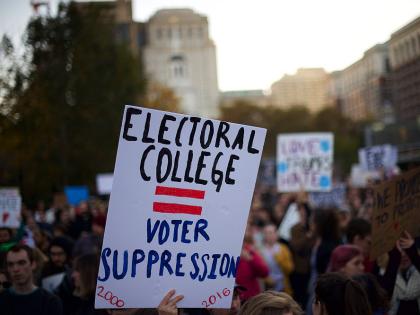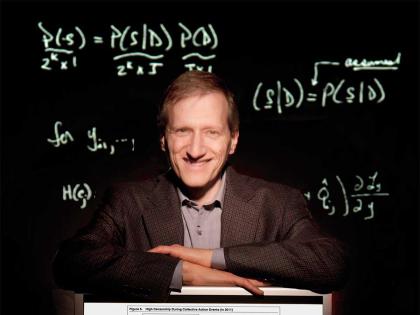Outgoing North Carolina senator John Edwards wasn't the first person to notice the Second America, which he described in a primary campaign speech as a place where full-time workers live in poverty, lack healthcare, and pay high taxes. In 1991, conservative commentator Patrick J. Buchanan took a cab ride uptown in New York City every night for a week. "It was like passing through a different world," he wrote. "We are two countries; and many Americans in the first country are getting weary of subsidizing and explaining away the deepening failure of the second."
If there are two Americas, the "failure" of the second may derive from the worldview of the first. In a new book, Fighting Poverty in the U.S. and Europe: A World of Difference, Ropes professor of political economy Alberto Alesina and professor of economics Edward L. Glaeser suggest that a nation's racial diversity and political institutions shape its approaches to solving poverty by redistributing wealth. "Either Americans overestimate how easy it is for the poor to get rich," Alesina says, "or the Europeans overestimate how difficult it is for the poor to get out of poverty." He cites data indicating that 71 percent of Americans believe people can get out of poverty, while 60 percent of Europeans think the poor are trapped there.
Data on social mobility, the ease with which one may move up or down the income ladder, suggest that the poor in both places are equally mobileor equally trapped, depending on your perspective. For the most part, Americans tend to celebrate vast opportunity and embrace an immigrant past. This view implies, of course, that if our largely penniless grandfathers forged successful lives right off the boat, today's poor can do it, too. Therefore, the authors write, many Americans believe that "anyone who remains poor pretty much deserves to be poor." Surveys show that 60 percent of Americans think the poor are just lazy, whereas in Europe, a similar fraction believes that luck explains why people are rich.
"The [American] political system is self-indulgent," Alesina says. "The founding fathers certainly envisioned the extension of wealth, even if they may not have imagined its contemporary proportions, and crafted a political system to protect its holders." American decentralization administers power in progressively larger jurisdictions: city, county, state, and federal. Sharing wealth between and among those jurisdictions is often difficult. "The more restricted the size of a political jurisdictionsay, an inner citythe more difficult it is to redistribute from outside that jurisdiction, such as from wealthy white suburbs [back to] the inner city," Alesina explains. The authors contend that half the difference between European and American redistribution policies stems from deliberately constructed differences in the political systems.
The other half comes from the thorniest political issue in America: race. Alesina's fractionalization indicescomparable percentages of racial, ethnic, linguistic, and religious diversity, which he has compiled for more than 160 countriesshow that America is more than four times as racially diverse as the Netherlands, itself the most diverse nation in western Europe. European data suggest that greater homogeneity correlates with generous welfare policies (and with the growth of socialist political parties that support them). In Norway and Iceland, for example, diversity is low and welfare spending high. Conversely, the greater the racial diversity of individual American states, Alesina found, the less those states spend on welfare. "I would call it an effect of trust," Alesina explains, citing surveys indicating that people are prone to trust members of their own racial group and distrust those who look dissimilar. "One may like this or not like it," he says, "but these are the facts."
Race, he has found, also forms attitudes toward reallocating wealth. "Being white is a very strong determinant [of being] against redistribution," he says. "Even if you control for income, gender, where a person lives, everything you can think of, it's the strongest of all." Because of the country's diversity and political history, Americans perceive the poor, he writes, as "different (read: black)." Most of us identify racially first and socioeconomically second, he continues, which makes the poor a difficult political constituency to unite because they are racially diverse. Divided, the poor stand little chance of redirecting wealth their way.
Europeans and Americans also define poverty differently. Since 1964, the United States has set the poverty level by adjusting the cost of a good diet against the consumer price index and multiplying by, roughly, three, because the average American spends a third of his or her after-tax dollars on food. The result is the poverty line, this year $18,810 for a family of four, whether in Boston or Biloxi.
In Europe, however, how poor you are in the eyes of the state depends on how rich your neighbor is. "Solving poverty in the United States means raising people above the poverty line," says Alesina, who was born in Italy. "In Europe it means decreasing income inequality"and so, with scant talk of absolute poverty and much discussion of inequality, it's no wonder Europeans "live under the illusion that poverty has been eliminated."
But if you're waiting for the United States, where the number of people officially living in poverty increased yearly from 2001 through 2003, to become more like Europe before the Second America shrinks, "Keep hoping," Alesina says. That's another way of saying that changes in policy usually follow changes in perspectives. "We would do well to remember how much of all of our views are formed by indoctrination, not reality," Alesina and Glaeser write, "and to recognize that there is usually a significant amount of truth in the opposing viewpoint as well."
~Jina Moore
Alberto Alesina e-mail address:
aalesina@harvard.edu








